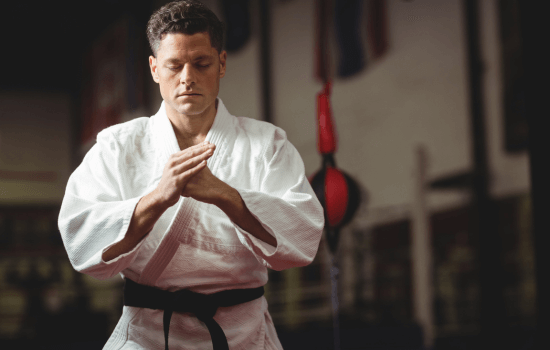Advertisements
Discover the Art of Karate
Karate is much more than a physical discipline; it is a philosophy that combines strength, balance and self-control. Although mastering Karate can take years of practice, there are ways to learn the basics quickly and advance to an intermediate level.
This article will guide you step by step to begin your journey in this fascinating martial art.
Benefits of Practicing Karate
- Physical improvement: Increase strength, flexibility and endurance.
- Self-defense: Provides practical tools to protect you in risky situations.
- Mental discipline: Strengthens focus, patience and self-control.
- Trust: Develop strong self-esteem as you master new techniques.
Steps to Learn Karate Quickly
1. Find a Good Instructor or Online Course
An experienced instructor can speed up your learning by correcting mistakes early on. If you can't access in-person classes, platforms like YouTube, Udemy, and MasterClass offer well-structured courses for beginners.
Advertisements
See also
- Teas to Control Glucose
- Transform Your Diet With This Free App
- The Best Apps to Learn Violin for Free
- Free Apps to Learn Judô Quickly
- Learn to play the guitar quickly with these apps
Advertisements
Recommendations:
- Look for recognized Karate schools in your area.
- Sign up for online programs with good reviews and clear videos.
2. Learn the Basics
Basic Postures
- Zenkutsu Dachi (Front Stance): Stability for attacks and blocks.
- Kiba Dachi (Rider's Stance): Ideal for strengthening legs and balance.
Key Moves
- Blockages: Gedan Barai (low block) and Age Uke (high block).
- Hits: Oi Zuki (straight fist) and Gyaku Zuki (reverse fist).
- Kicks: Mae Geri (front kick) and Yoko Geri (side kick).
3. Practice at Home
Dedicate at least 30 minutes a day to practicing the techniques you have learned. Divide your session into:
- Heating: 5-10 minutes of stretching and light exercises.
- Techniques: Repeat key movements until you perfect them.
- Katas: Predefined sequences that combine several techniques.
4. Develop your strength and flexibility
Karate requires a strong and flexible body. It incorporates exercises such as:
- Push-ups: To strengthen arms and shoulders.
- Squats: Improve kicking power and stability.
- Stretching: They increase the range of motion in the legs and hips.
5. Study the Principles of Karate
Karate is not just about strength; it also involves following an ethical code. Learn about the principles of respect, humility and self-control that guide this discipline.
Tools for learning Karate
Digital Applications and Resources
- Karate Trainer: Offers interactive tutorials and progress tracking.
- Dojo App: A complete guide to practicing at home with daily exercises.
- YouTube: Channels such as “Karate Dojo” and “Shotokan Karate Online” offer quality content.
Necessary Equipment
- Karategi: Official Karate uniform.
- Protections: Gloves, shin guards and helmet for safe training.
- Suitable Space: A clear area to practice unrestricted movement.
Tips for Rapid Progress
- Repeat Constantly: The key to Karate is constant practice. Repeat techniques until they become second nature.
- Record your Practices: Analyze your movements to identify errors and improve them.
- Participate in Group Classes: Training with others motivates you and accelerates your learning.
- Set Goals: Set weekly goals, such as learning a new Kata or perfecting a kick.

Frequently Asked Questions (FAQ)
How long does it take to learn Karate?
It depends on your dedication. With constant practice, you could master the basics in 3-6 months.
Is an instructor necessary to get started?
No, you can start with online resources, but an instructor speeds up the process and ensures you learn correctly.
Can I learn Karate if I am an adult?
Of course. Karate is suitable for all ages and fitness levels.
Is it safe to practice Karate at home?
Yes, as long as you take precautions, such as avoiding slippery surfaces and warming up before training.
What type of Karate is best for beginners?
Shotokan is an excellent choice for its emphasis on fundamentals and kata.
References
- “Karate: The Art of Empty-Hand Fighting,” Gichin Funakoshi.
- Recommended channels: Karate Dojo on YouTube.
- Recommended app download: Google Play | App Store.